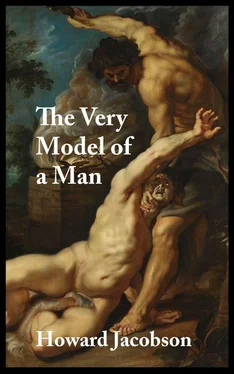It is a brave try, but even she knows it will not succeed.
‘I am certain you understand me,’ Naaman says, ‘but since you force me — there is the question of with whom you will be lying.’
A calm, quiet as devotion, falls with the feather-touch of fatality itself on Zilpah’s narrow shoulders. It is good, now that there is no more colour left to rise in her, and no greater transparency that she can show, to have the unmentionable mentioned. It even releases some capacity for archness in her. ‘You don’t care for him, then?’ she notices.
‘Isn’t it a question, rather, of his not caring for you?’
‘Who told you that?’
‘My dear, everyone who has observed you.’
She is silent for a little while, content to be propelled by her father at his speed. Then she says, ‘We are all in accord in that case. You do not care for us together; he does not care for me; and I do not care for him.’
Another of Naaman’s white marble laughs. ‘You are not saying that for the sake of symmetry, I hope.’
She shakes her head violently enough for her plait to rise and flick the air, like a horse’s tail. ‘I don’t think caring has ever been the issue,’ she says.
Naaman sneaks a glance at her. In the unceasing war which irony and prudery play out on the wet terrain of his unsteady mouth, prudery appears suddenly to hold the upper hand. ‘There are some things it is not necessary for a father to know about his daughter,’ he says.
‘This is not a conversation of my choosing,’ she reminds him.
‘I know,’ he says.
‘The lentils were your idea, not mine.’
‘I know,’ he says. Elegantly abashed.
‘So, since you mean to attend my funeral, you should know what I might die of.’
He doesn’t answer. Only tightens his grip on her elbow and works his lips into a kind of poultice of distaste.
‘It won’t be love,’ she assures him.
He catches an unexpected bitterness in these last words, and this emboldens him to ask what it will be instead. ‘Hate?’
This time she is the one who is able to find a laugh. ‘Old age,’ she says.
It’s possible he is disappointed. What father does not want to hear his daughter confess an ugly and, if possible, unrequited infatuation? What father does not nurse the furtive ambition of having the old jealous dread — the humiliation of rivalry, the vicarious ignominy of rejection — realised just once?
But there are consolations to seek, no less than thrills. It can be as great a satisfaction to discover that your daughter is well, as that she isn’t.
He stops and puts his beautiful violet fingers to her cheeks, so that she may find a little moment of peace in their immunising smell; then, as though examining her for fever, he drops them lower and feels for her salivary glands. ‘So it’s all right?’ he asks tenderly.
Here is exposure of another kind. She steps back from him and reaches for her plait. It is essential she have something she can pick at. ‘Yes, it’s all right.’
‘You sound hesitant.’
She hesitates. ‘It will be all right.’
There are to be thrills for Naaman after all. ‘Do you want me —?’
She shakes her head. ‘I don’t wish him… harm.’
‘But you wish him… away?’
She thinks about that, her eyes lowered, looking for her answer in the paving stones. ‘No. Not away.’
Naaman follows her gaze, wondering whether she is finessing as to grammar, as to particles of place. If away is not exactly it, how about below? This frightens even him. ‘You don’t mean…?’
They stand solemnly, shoulder to shoulder, staring at the paved street and imagining what lies beneath it. It is not usual for them to be amused by each other simultaneously, but she reads his thoughts at the very moment he reads hers, and the coincidence leads to merriment.
They present a tableau which Preplen, observing them from across the street where he is sitting rehearsing imprecations over an infusion of bitter herbs, finds it easy to interpret. Another Shinarite conspiracy. Another whorish daughter of Babel confiding her secrets to the Shinarite whoremonger, her father. More laughter over a stranger — traveller from Nod or Eden, worshipper of Law and Y-H-W-H. More poison which will finally find its way to him, Preplen, and carry him off like one of those rats whose extermination the civic authorities of Babel have perfected.
Conspiracy theories never go far enough. It does not fall within the compass even of Preplen’s paranoia to guess that Naaman and Zilpah, father and daughter, are at that instant, if only for that instant, sharing the amusement of imagining Cain laid out before them in unimpressionable earth.
‘No,’ says Zilpah. ‘I do not mean that.’
Naaman rubs his chin in mock perplexity. ‘Not here. Not there. Not away. Not under. I am wondering where that leaves.’
‘Up,’ says Zilpah. And because the pair are in high spirits now, she adds, ‘And I don’t mean in smoke.’
‘Up?’
‘Yes, up. He dreams of being buried in a tower. Let him build one.’
‘My dear, are we speaking of immurement?’
‘No, but he is. We are speaking only of loaning him an architect.’
‘And a thousand masons.’
‘More likely two thousand. He dreams of building very high.’
Naaman’s lips again take on their poultice look. ‘They always have such extravagant ambitions,’ he says.
‘They?’
‘He — the Edenite. By they I simply mean the type.’
She worries over, worries around, her father’s proposition. Do they have extravagant ambitions? Does he? Is there profit in considering him a type? She had thought she had done and felt something exceptional, but if he is a type then perhaps she has merely done and felt something typical. Yes, there is profit to her in that. She can easier forgive herself a typical mistake. She can, perhaps, even look forward to making it again, if there are more like him bound to show up in Babel. Or she can generalise her hatred of him, dignifying it with universal truths and comprehensive observations, for there is moral and intellectual honour, not to say duty, in despising what is hateful in the type rather than the individual.
Surprising, the room there is for conflict in that narrow chest. Watching her through the steam of his herbal infusion, Preplen thinks she is standing silent, with her head bowed, picking at her plait, because that is the attitude Shinarite women strike when they are plotting ways of inveigling dark-skinned strangers. Whereas, in truth, what she is revolving is the allopathic drama whereby a private wound turns into a public scar.
She meets her father’s eye and signals that it is all right for him to release the twinkle he has been holding back. ‘Well, then,’ she begins, ‘if the heavens are the only place that will satisfy them —’
‘We should encourage their ascent? You are more wicked than your father. But will he stay there once he gets there?’
‘He will never leave.’
‘Are you the cause of that?’
‘Me? No. Worms.’
‘And you’re sure you wouldn’t, in that case —?’ He gestures with his thumb in the direction of the place to which they had alluded earlier.
She smooths her plait, doing her father the credit of showing a long consideration to his offer. But, ‘No,’ is her decision. ‘No, I don’t think so. I know the type. They are primed for anything that looks like persecution. If you want to make them really suffer, you give them what they want.’
Watching, watching, through eyes that neither take in nor let out light, Preplen gratefully receives the thing he wants.
‘I’m not acting for myself,’ Cain tells his Anatolian masseur. ‘I’m not here on my own behalf.’
Читать дальше











